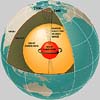| . |  |
. |
Manila (AFP) Feb 01, 2006 Imagine turning a worthless waste material into an innovative, biodegradable product that protects the environment, promotes plant growth and gives jobs to poor farmers. Former agriculture college dean Justino Arboleda, 56, has done just that. He has turned the lowly husk of the coconut fruit, the most ubiquitous plant in his native Philippines, into an award-winning product. His innovation makes use of the husk fibers to produce a tough but biodegradable netting that anchors the soil on sloping land as well as river banks, protecting against erosion while encouraging the growth of vegetation. The product, called "coconet", has been adopted in infrastructure projects all over this Southeast Asian archipelago, as well as in China and Sri Lanka. It landed the top prize of the 2005 BBC World Challenge, where it beat some 456 entries from 90 countries for best innovative grassroots project and earned Arboleda a 20,000-dollar prize and recognition from both BBC and Newsweek magazine. A late 1980s study commissioned by the Philippines-based Asian Development Bank into the conditions of millions of coconut farmers in his impoverished Bicol region inspired Arboleda's invention. The study he conducted found that "most farmers in Bicol live below the poverty line", unable to earn enough money off their small plots, Arboleda said. The dried coconut meat, or "copra", was the only part of the tall plant that had recognized economic value -- the raw material for vegetable oil, soap, animal feed and industrial processes. The discarded husks were the largest waste product of the coconut-growing regions. Arboleda estimates the Philippines produces 12 billion coconut husks a year with 75 percent of them thrown away. "We wanted to give jobs to the farmers, especially the women," who often are left idle when the coconut crop has been harvested, he said. "We found a way to mill (coconut) husks, convert them to fibers and bring (the fibers) to the houses" of the farmers, where their wives would spin them into a tough thread which in turn is woven into the netting. The net could then be laid onto sloping land, especially the kind left behind in road construction. Using his life savings and money borrowed from relatives, Arboleda in 1995 set up a company to help save the planet and his neighbors with an initial capital outlay of 100,000 pesos (3,817 dollars). A factory was set up in Bicol, to make use of the excess labor in the area. The company is now worth about 20 million pesos with 13 million pesos in sales last year. He named the company Juboken Enterprises -- a combination of the nicknames of Arboleda, his wife and son -- but also a Japanese word meaning "important venture". The company subcontracts the thread and net-weaving to local farming families, giving them an extra daily income of 150-200 pesos a day. Arboleda says his product not only holds the soil down against erosion. It absorbs water, preventing soil runoff from rains while serving as a fertile bed for plant growth. It can also be installed manually unlike alternatives which often require heavy equipment. "Before, everyone would use plastic nets or steel wire," or even concrete to shore up slopes, he said. "Coconut fiber is cheap, it does not deteriorate quickly," he said, allowing plants to grow in coconet-covered slopes or river banks, to eventually anchor the soil down. In tests, coco-fiber has lasted for four years submerged in water, he said. The product is now used to shore up the exposed earth in dam and highway projects in the Philippines, preventing landslides in hillside housing projects and covering garbage used as landfill. Arboleda recently sealed an agreement with China to study how coconet could be used in slowing desertification. He said that when he offered his product for use in a landfill in the southern Chinese city of Guangzhou, the Chinese were skeptical that it would be better than plastic netting. So he spent 500,000 pesos of his own money to prove coconet would work. He has also struck a deal with a Sri Lankan company to provide the technical know-how on how to use coco-fiber in that country. Arboleda also has agreements with companies in the Netherlands to make doormats from the material and do joint research on other ways to use coco-fiber. In addition, Arboleda has found a way to use the dust produced when coconut husks are made into fibers. He turns it into "coco-peat": a fertile, porous soil-like material used as a growing medium for plants and can be shaped like bricks, pots or posts, for ornamental vegetation.
Source: Agence France-Presse Related Links -  Twin Cities MN (SPX) Feb 01, 2006
Twin Cities MN (SPX) Feb 01, 2006University of Minnesota associate professor of chemical engineering Renata Wentzcovitch and her team of researchers have confirmed the properties of a mineral (post-perovskite) that may form near the Earth's core in a layer called the D'' region. The work offers new insight for interpreting properties of this region. The D'' (Dee double prime) layer surrounds Earth's core and is between 0 and 186 miles thick. |
|
| The content herein, unless otherwise known to be public domain, are Copyright 1995-2006 - SpaceDaily.AFP and UPI Wire Stories are copyright Agence France-Presse and United Press International. ESA PortalReports are copyright European Space Agency. All NASA sourced material is public domain. Additionalcopyrights may apply in whole or part to other bona fide parties. Advertising does not imply endorsement,agreement or approval of any opinions, statements or information provided by SpaceDaily on any Web page published or hosted by SpaceDaily. Privacy Statement |